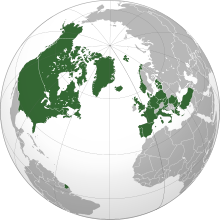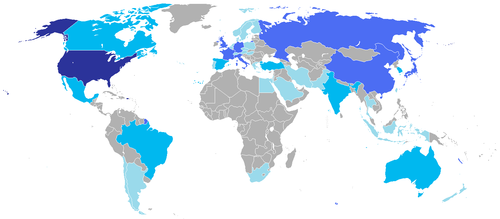- Power in international relations
-
Power in international relations is defined in several different ways. Political scientists, historians, and practitioners of international relations (diplomats) have used the following concepts of political power:
- Power as a goal of states or leaders;
- Power as a measure of influence or control over outcomes, events, actors and issues;
- Power as reflecting victory in conflict and the attainment of security; and,
- Power as control over resources and capabilities.
Modern discourse generally speaks in terms of state power, indicating both economic and military power. Those states that have significant amounts of power within the international system are referred to as middle powers, regional powers, great powers, superpowers, or hyperpowers/hegemons, although there is no commonly accepted standard for what defines a powerful state.
Entities other than states can also acquire and wield power in international relations. Such entities can include multilateral international organizations, military alliance organizations (e.g. NATO), multinational corporations, non-governmental organizations, or other institutions such as the Roman Catholic Church, Wal-Mart,[1] or the Hanseatic League.
Contents
Power as a goal
Primary usage of "power" as a goal in international relations belongs to political theorists, such as Niccolò Machiavelli and Hans Morgenthau. Especially among Classical Realist thinkers, power is an inherent goal of mankind and of states. Economic growth, military growth, cultural spread etc. can all be considered as working towards the ultimate goal of international power.
Power as influence
 NATO accounts for over 70% of global military expenditure,[2] with the United States alone accounting for 43% of global military expenditure.[3]
NATO accounts for over 70% of global military expenditure,[2] with the United States alone accounting for 43% of global military expenditure.[3]
Political scientists principally use "power" in terms of an actor's ability to exercise influence over other actors within the international system. This influence can be coercive, attractive, cooperative, or competitive. Mechanisms of influence can include the threat or use of force, economic interaction or pressure, diplomacy, and cultural exchange.
Spheres, blocs, and alliances
Under certain circumstances, states can organize a sphere of influence or a bloc within which they exercise predominant influence. Historical examples include the spheres of influence recognized under the Concert of Europe, or the recognition of spheres during the Cold War following the Yalta Conference. The Warsaw Pact, the "Free World", and the Non-Aligned Movement were the blocs that arose out of the Cold War contest. Military alliances like NATO and the Warsaw Pact are another forum through which influence is exercised. However, "realist" theory often attempts to stay away from the creation of powerful blocs/spheres that can create a hegemon within the region. British foreign policy, for example, has always sided against the hegemonic forces on the continent, i.e. Nazi Germany, Napoleonic France or Habsburg Austria.
Power as security
Power is also used when describing states or actors that have achieved military victories or security for their state in the international system. This general usage is most commonly found among the writings of historians or popular writers. For instance, a state that has achieved a string of combat victories in a military campaign against other states can be described as powerful. An actor that has succeeded in protecting its security, sovereignty, or strategic interests from repeated or significant challenge can also be described as powerful.
Power as capability
American author Charles W. Freeman, Jr. described power as the following:
Power is the capacity to direct the decisions and actions of others. Power derives from strength and will. Strength comes from the transformation of resources into capabilities. Will infuses objectives with resolve. Strategy marshals capabilities and brings them to bear with precision. Statecraft seeks through strategy to magnify the mass, relevance, impact, and irresistibility of power. It guides the ways the state deploys and applies its power abroad. These ways embrace the arts of war, espionage, and diplomacy. The practitioners of these three arts are the paladins of statecraft.[4]Power is also used to describe the resources and capabilities of a state. This definition is quantitative and is most often used by geopoliticians and the military. Capabilities are thought of in tangible terms—they are measurable, weighable, quantifiable assets. Thomas Hobbes spoke of power as "present means to obtain some future apparent good." Hard power can be treated as a potential and is not often enforced on the international stage.
Chinese strategists have such a concept of national power that can be measured quantitatively using an index known as comprehensive national power.
Hard versus soft power
Some political scientists distinguish between two types of power: Hard and Soft. The former is coercive while the latter is attractive.
Hard power refers to coercive tactics: the threat or use of armed forces, economic pressure or sanctions, assassination and subterfuge, or other forms of intimidation. Hard power is generally associated to the stronger of nations, as the ability to change the domestic affairs of other nations through military threats. Realists and neorealists, such as John Mearsheimer, are advocates of the use of such power for the balancing of the international system.
Joseph Nye is the leading proponent and theorist of soft power. Instruments of soft power include debates on cultural values, dialogues on ideology, the attempt to influence through good example, and the appeal to commonly accepted human values. Means of exercising soft power include diplomacy, dissemination of information, analysis, propaganda, and cultural programming to achieve political ends.
Categories of power
 Map reflecting the categories of power in international relations.
Map reflecting the categories of power in international relations. countries most often considered to be Great powerscountries most often considered to be Middle powers[5]
countries most often considered to be Great powerscountries most often considered to be Middle powers[5]In the modern geopolitical landscape, a number of terms are used to describe various types of powers, which include the following:
- Superpower: In 1944, Fox[clarification needed] defined superpower as "great power plus great mobility of power" and identified 3 states, the British Empire, the Soviet Union and the United States.[6] The United States is currently considered a superpower with China, India and the European Union being potential superpowers.
- Great power: In historical mentions, the term great power refers to any nations that have strong political, cultural and economic influence over nations around it and across the world. China, France, Germany,[7][8][9][10][11] Japan, India, Russia, and the United Kingdom are often considered to be current great powers.
- Regional power: Used to describe a nation that exercises influence and power within a region. Being a regional power is not mutually exclusive with any of the other categories of power. Many countries are often described as regional powers, among those are India, South Africa, Israel, South Korea, Brazil, and Indonesia.
- Middle power: A subjective description of second-tier influential states that could not be described as great powers.
Other types of power
The term energy superpower describes a country that has immense influence or even direct control over much of the world's energy supplies. Saudi Arabia and Russia, possibly Canada and Australia are generally acknowledged as the world's current energy superpowers, given their abilities to globally influence or even directly control prices to certain countries.
The term cultural/entertainment superpower describes a country in which has immense influence or even direct control over much of the world's entertainment or has an immense large cultural influence on much of the world. Although this is debated on who meets such criteria, many agree that the United Kingdom,[12] United States, France, India and Japan[13][14] are generally acknowledged as the entertainment and cultural superpowers, given their abilities to distribute their entertainment and cultural innovations worldwide.
Modern Age European powers
From the 15th century to the early 18th century the five major powers in Europe were England, France, Portugal, Spain and the Ottoman Empire. During the 17th and 18th centuries the Habsburg monarchy was added to the group, whilst Portugal, Spain and the Ottomans progressively lost their power and influence. In 1707 Great Britain (created by the unification of the kingdoms of England and Scotland) replaced England, and progressively became more powerful during the 18th century, becoming embroiled with other European powers, particularly France, for control of territory outside of Europe, such as North America and India. In the second half of the 18th century Russia and Prussia gained major status.
During Early Modern European Age a group of other states including Sweden, the Netherlands, the Kingdom of the Two Sicilies, the Papal States, Denmark–Norway, the Polish–Lithuanian Commonwealth and Bavaria were recognised as having important impact on the European balance of power.
From the late 18th century and during all the 19th century, there was an informal convention recognising Five Great Powers in Europe: France, Great Britain, Russia, Austria (later Austro-Hungary) and the Kingdom of Prussia (later the German Empire). From the late 19th century Italy was added to this group. Eventually two extra non-European powers, Japan and the United States, were able to gain the same great power status from the start of 20th century.
See also
- Balance of power in international relations
- Lateral Pressure Theory
- National power
- Peace through strength
- Power transition theory
Notes
- ^ Useem, Jerry (2003-03-03). "One Nation Under Wal-Mart How retailing's superpower--and our biggest Most Admired company--is changing the rules for corporate America". CNN. http://money.cnn.com/magazines/fortune/fortune_archive/2003/03/03/338383/index.htm. Retrieved 2010-05-22.
- ^ "The SIPRI Military Expenditure Database". Milexdata.sipri.org. http://milexdata.sipri.org/. Retrieved 2010-08-22.
- ^ "The 15 countries with the highest military expenditure in 2009". http://www.sipri.org/research/armaments/milex/resultoutput/15majorspenders. Retrieved 2010-08-22.
- ^ [1]
- ^ Adam Chapnick, The Middle Power.
- ^ Evans. G. & Newnham. J., (1998) Dictionary of International Relations. London: Penguin Books (Page 522)
- ^ jstor.org
- ^ foreignaffairs.org| Ben W. Heineman, Jr., and Fritz Heimann speak of Italy as a major country or "player" along with Germany, France, India, Japan, and the United Kingdom, in "The Long War Against Corruption".
- ^ M. De Leonardis, Il Mediterraneo nella politica estera italiana del secondo dopoguerra, Bologna, Il Mulino, 2003, p. 17
- ^ carabinieri.it
- ^ books.google.com
- ^ "happytellus.com: United Kingdom". happytellus.com. http://www.happytellus.com/united-kingdom.
- ^ "washingtonpost.com: Japan's Empire of Cool". Washingtonpost.com. http://www.washingtonpost.com/ac2/wp-dyn/A33261-2003Dec26?language=printer. Retrieved 2009-07-17.
- ^ "The other superpower". London: www.guardian.co.uk. 2002-06-01. http://www.guardian.co.uk/artanddesign/2002/jun/01/artsfeatures.features. Retrieved 2009-07-17.
References
- ”International Organisation as Coordination in N-person Games”, in Political Studies (Lane & Maeland), Vol(54)(1).
- What is power? by Niall Ferguson. www.hoover.org.
- Weak States in the International System by Michael I. Handel. books.google.com.
External links
Powermetrics Information Network
Power in international relations Types of power Economic power · Energy superpower · Food power · Hard power · National power · Political power (Machtpolitik · Realpolitik) · Smart power · Soft powerTypes of power status Small powers · Middle power · Regional power · Great power · Superpower (Potential superpowers) · HyperpowerGeopolitics Theory and history Balance of power (European balance of power) · Historical powers · Philosophy of power · Polarity · Power projection · Power transition theory · Second Superpower · Sphere of influence · Superpower collapse · Superpower disengagementStudies Organizations
and groupsAfrican Union · ANZUS · APEC · Arab League · ASEAN · BRICS · CIS · Commonwealth of Nations · CSTO · European Union · G7 · G8 · G8+5 · G20 · G77 · GCC · IBSA · MSG · Mercosur · N-11 · NATO · Non-Aligned Movement · OAS · OECD · SAARC · SCO · Union for the Mediterranean · Union of South American Nations · United NationsCategories:- Geopolitical rivalry
- Political history
Wikimedia Foundation. 2010.

